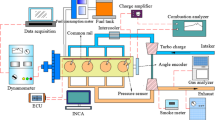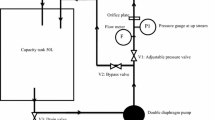Abstract
In this study, the effects of hydrogen addition on diesel-biodiesel-butanol fuel blends were investigated in terms of engine performance, combustion, and emission characteristics under different engine operating conditions. The experiments were performed with eight different fuel blends at a constant engine speed of 2000 rpm, which is the maximum torque value of all test fuels. The four operating conditions were at 25%, 50%, 75%, and 100% engine loads. Hydrogen was delivered to diesel-biodiesel-butanol fuel blends through the intake manifold with different rates of fuel mass consumption. The experiment results were compared with euro diesel and absence of hydrogen addition for all test fuels. The experimental results have revealed that at 2000 rpm engine speed, the brake torque, in-cylinder pressure, and exhaust gas temperature increased with the addition of hydrogen. Nevertheless, the brake-specific fuel consumption, carbon monoxide (CO), carbon dioxide (CO2), hydrocarbon (HC), nitrogen oxides (NOx), and smoke opacity emissions decreased under various engine conditions. The heat release rate was generally shown to be decreased with higher engine loads and increased with lower engine load conditions, while a rise in thermal efficiency was observed. Therefore, the addition of hydrogen in a diesel engine usually exhibited fewer emissions, improved the combustion process, and increased the brake torques of the engine by comparison to the absence of hydrogen addition.











Similar content being viewed by others
Abbreviations
- ABDC:
-
After bottom dead center
- EVO:
-
Exhaust valve open
- ATDC:
-
After top dead center
- HC:
-
Hydrocarbon
- be :
-
Effective brake-specific fuel consumption (g/kWh)
- HRRmax :
-
Maximum heat release rate
- Be :
-
Effective fuel consumption (g/h)
- ID:
-
Ignition delay
- BBDC:
-
Before bottom dead center
- IT:
-
Injection time
- BP:
-
Brake power (kW)
- IVC:
-
Intake valve closed
- BSFC:
-
Brake-specific fuel consumption
- IVO:
-
Intake valve open
- BTDC:
-
Before top dead center
- LHV:
-
Lower heating value
- B20:
-
20% biodiesel plus 80% euro diesel (volumetric)
- Me:
-
Effective engine torque (Nm)
- B20But5:
-
20% biodiesel plus 75% euro diesel plus 5% butanol (volumetric)
- n:
-
Engine speed (rpm)
- B20But5 + H2 :
-
20% biodiesel plus 75% euro diesel plus 5% butanol (volumetric) + hydrogen
- NaOH:
-
Sodium hydroxide
- B20But10:
-
20% biodiesel plus 70% euro diesel plus 10% butanol (volumetric)
- NO:
-
Nitrogen monoxide
- B20But10 + H2 :
-
20% biodiesel plus 70% euro diesel plus 10% butanol (volumetric) + hydrogen
- NOx :
-
Nitrogen oxides
- BTE:
-
Brake thermal efficiency
- P:
-
Cylinder pressure (bar)
- CD:
-
Combustion duration
- Pe:
-
Effective brake power (kW)
- CFPP:
-
Cold filter plugging point
- PM:
-
Particulate matter
- CI:
-
Compression ignition
- ppm:
-
Parts per million
- CN:
-
Cetane number
- rpm:
-
Revolution per minute
- CO:
-
Carbon monoxide
- Qnet :
-
Heat value (J)
- CO2 :
-
Carbon dioxide
- SOC:
-
Start of combustion
- CPmax :
-
Maximum cylinder pressure
- TDC:
-
Top dead center
- D:
-
Diesel
- THC:
-
Total hydrocarbons
- DI:
-
Direct injection
- Tex:
-
Exhaust gas temperature
- D100:
-
100% euro diesel
- WCOME:
-
Waste cooking oil methyl ester
- D100 + H2 :
-
100% euro diesel+hydrogen
- V:
-
Cylinder volume (m3)
- EGT:
-
Exhaust gas temperature
- θ:
-
Represents crank angle (oCA)
- EOC:
-
End of combustion
- γ:
-
Specific heat the ratio
- EVC:
-
Exhaust valve closed
References
Javed S, Satyanarayana Murthy YVV, Satyanarayana MRS, Rajeswara Reddy R, Rajagopal K (2016) Effect of a zinc oxide nanoparticle fuel additive on the emission reduction of a hydrogen dual-fuelled engine with jatropha methyl ester biodiesel blends. J Clean Prod 137:490–506
Sharma P, Dhar A (2018) Effect of hydrogen supplementation on engine performance and emissions. Int J Hydrog Energy 43(15):7570–7580
Hosseini SM, Ahmadi R (2017) Performance and emissions characteristics in the combustion of co-fuel diesel-hydrogen in a heavy duty engine. Appl Energy 205:911–925
Doğan O (2011) The influence of n-butanol/diesel fuel blends utilization on a small diesel engine performance and emissions. Fuel 90(7):2467–2472
Han X, Yang Z, Wang M, Tjong J, Zheng M (2017) Clean combustion of n-butanol as a next generation biofuel for diesel engines. Appl Energy 198:347–359
Emiroğlu AO, Şen M (2018) Combustion, performance and emission characteristics of various alcohol blends in a single cylinder diesel engine. Fuel 212:34–40
Örs I, Sarıkoç S, Atabani AE, Ünalan S, Akansu SO (2018) The effects on performance, combustion and emission characteristics of DICI engine fuelled with TiO 2 nanoparticles addition in diesel/biodiesel/n-butanol blends. Fuel 234:177–188
Uyumaz A (2018) Combustion, performance and emission characteristics of a DI diesel engine fueled with mustard oil biodiesel fuel blends at different engine loads. Fuel 212:256–267
Miyamoto T, Hasegawa H, Mikami M, Kojima N, Kabashima H, Urata Y (2011) Effect of hydrogen addition to intake gas on combustion and exhaust emission characteristics of a diesel engine. Int J Hydrog Energy 36(20):13138–13149
Yilmaz IT, Gumus M (2018) Effects of hydrogen addition to the intake air on performance and emissions of common rail diesel engine. Energy 142:1104–1113
Karagöz Y, Güler İ, Sandalcı T, Yüksek L, Dalkılıç AS (2016) Effect of hydrogen enrichment on combustion characteristics, emissions and performance of a diesel engine. Int J Hydrog Energy 41(1):656–665
Karagöz Y, Sandalcı T, Yüksek L, Dalkılıç AS (2015) Engine performance and emission effects of diesel burns enriched by hydrogen on different engine loads. Int J Hydrog Energy 40(20):6702–6713
Koten H (2018) Hydrogen effects on the diesel engine performance and emissions. Int J Hydrog Energy 43(22):10511–10519
Tarabet L, Lounici MS, Loubar K, Khiari K, Bouguessa R, Tazerout M (2018) Hydrogen supplemented natural gas effect on a DI diesel engine operating under dual fuel mode with a biodiesel pilot fuel. Int J Hydrog Energy 43(11):5961–5971
Saravanan N, Nagarajan G (2009) An insight on hydrogen fuel injection techniques with SCR system for NOX reduction in a hydrogen–diesel dual fuel engine. Int J Hydrog Energy 34(21):9019–9032
Zhou JH, Cheung CS, Leung CW (2014) Combustion, performance, regulated and unregulated emissions of a diesel engine with hydrogen addition. Appl Energy 126:1–12
Zhou JH, Cheung CS, Zhao WZ, Leung CW (2016) Diesel–hydrogen dual-fuel combustion and its impact on unregulated gaseous emissions and particulate emissions under different engine loads and engine speeds. Energy 94:110–123
Jhang S-R, Chen K-S, Lin S-L, Lin Y-C, Amesho KTT, Chen C-B (2018) Evaluation of the reduction in carbonyl emissions and ozone formation potential from the exhaust of a heavy-duty diesel engine by hydrogen-diesel dual fuel combustion. Appl Therm Eng 132:586–594
Jhang S-R, Chen K-S, Lin S-L, Lin Y-C, Cheng WL (2016) Reducing pollutant emissions from a heavy-duty diesel engine by using hydrogen additions. Fuel 172:89–95
Akansu S (2004) Internal combustion engines fueled by natural gas? Hydrogen mixtures. Int J Hydrog Energy 29(14):1527–1539
Dimitriou P, Kumar M, Tsujimura T, Suzuki Y (2018) Combustion and emission characteristics of a hydrogen-diesel dual-fuel engine. Int J Hydrog Energy 43(29):13605–13617
Holman JP (2012) In: Holman JP (ed) Experimental methods for engineers, 8th edn. McGraw-Hill: Raghothaman Srinivasan
Serin H, Yıldızhan Ş (2018) Hydrogen addition to tea seed oil biodiesel: performance and emission characteristics. Int J Hydrog Energy 43(38):18020–18027
Yesilyurt MK, Eryilmaz T, Arslan M (2018) A comparative analysis of the engine performance, exhaust emissions and combustion behaviors of a compression ignition engine fuelled with biodiesel/diesel/1-butanol (C4 alcohol) and biodiesel/diesel/n-pentanol (C5 alcohol) fuel blends. Energy 165:1332–1351
Uludamar E (2018) Effect of hydroxy and hydrogen gas addition on diesel engine fuelled with microalgae biodiesel. Int J Hydrog Energy 43(38):18028–18036
Yıldızhan Ş, Uludamar E, Çalık A, Dede G, Özcanlı M (2017) Fuel properties, performance and emission characterization of waste cooking oil (WCO) in a variable compression ratio (VCR) diesel engine. Eur Mech Sci 1(2):56–62
Killol A, Reddy N, Paruvada S, Murugan S (2019) Experimental studies of a diesel engine run on biodiesel n-butanol blends. Renew Energy 135:687–700
Bari S, Mohammad Esmaeil M (2010) Effect of H2/O2 addition in increasing the thermal efficiency of a diesel engine. Fuel 89(2):378–383
Canakci M, Hosoz M (2006) Energy and exergy analyses of a diesel engine fuelled with various biodiesels. Energy Sources Part B: Econ Plann Policy 1(4):379–394
Dhar A, Kevin R, Agarwal AK (2012) Production of biodiesel from high-FFA neem oil and its performance, emission and combustion characterization in a single cylinder DICI engine. Fuel Process Technol 97:118–129
Huang H, Liu Q, Teng W, Pan M, Liu C, Wang Q (2018) Improvement of combustion performance and emissions in diesel engines by fueling n-butanol/diesel/PODE3–4 mixtures. Appl Energy 227:38–48
Can Ö (2014) Combustion characteristics, performance and exhaust emissions of a diesel engine fueled with a waste cooking oil biodiesel mixture. Energy Convers Manag 87:676–686
Özener O, Yüksek L, Ergenç AT, Özkan M (2014) Effects of soybean biodiesel on a DI diesel engine performance, emission and combustion characteristics. Fuel 115:875–883
Alptekin E, Canakci M, Ozsezen AN, Turkcan A, Sanli H (2015) Using waste animal fat based biodiesels–bioethanol–diesel fuel blends in a DI diesel engine. Fuel 157:245–254
Can Ö, Öztürk E, Solmaz H, Aksoy F, Çinar C, Yücesu HS (2016) Combined effects of soybean biodiesel fuel addition and EGR application on the combustion and exhaust emissions in a diesel engine. Appl Therm Eng 95:115–124
Chang Y-C, Lee W-J, Wu TS, Wu C-Y, Chen S-J (2014) Use of water containing acetone–butanol–ethanol for NO x -PM (nitrogen oxide-particulate matter) trade-off in the diesel engine fueled with biodiesel. Energy 64:678–687
Saravanan N, Nagarajan G, Sanjay G, Dhanasekaran C, Kalaiselvan KM (2008) Combustion analysis on a DI diesel engine with hydrogen in dual fuel mode. Fuel 87(17–18):3591–3599
Köse H, Ciniviz M (2013) An experimental investigation of effect on diesel engine performance and exhaust emissions of addition at dual fuel mode of hydrogen. Fuel Process Technol 114:26–34
Saravanan N, Nagarajan G (2010) Performance and emission studies on port injection of hydrogen with varied flow rates with diesel as an ignition source. Appl Energy 87(7):2218–2229
An H, Yang WM, Maghbouli A, Li J, Chou SK, Chua KJ (2013) A numerical study on a hydrogen assisted diesel engine. Int J Hydrog Energy 38(6):2919–2928
Parthasarathy M, Isaac JoshuaRamesh Lalvani J, Dhinesh B, Annamalai K (2016) Effect of hydrogen on ethanol-biodiesel blend on performance and emission characteristics of a direct injection diesel engine. Ecotoxicol Environ Saf 134(Pt 2):433–439
Sukjit E, Herreros JM, Dearn KD, Tsolakis A, Theinnoi K (2013) Effect of hydrogen on butanol–biodiesel blends in compression ignition engines. Int J Hydrog Energy 38(3):1624–1635
Bose PK, Maji D (2009) An experimental investigation on engine performance and emissions of a single cylinder diesel engine using hydrogen as inducted fuel and diesel as injected fuel with exhaust gas recirculation. Int J Hydrog Energy 34(11):4847–4854
Barrios CC, Domínguez-Sáez A, Hormigo D (2017) Influence of hydrogen addition on combustion characteristics and particle number and size distribution emissions of a TDI diesel engine. Fuel 199:162–168
Acknowledgments
The authors would like to acknowledge Erciyes University and Bayburt University, for the Scientific Research Projects Unit of Erciyes University, Turkey and for the financial support under the grant number FOA-2015-5817 and FBA-2017-7704.
Author information
Authors and Affiliations
Corresponding author
Additional information
Publisher’s Note
Springer Nature remains neutral with regard to jurisdictional claims in published maps and institutional affiliations.
Rights and permissions
About this article
Cite this article
Sarıkoç, S., Ünalan, S. & Örs, İ. Experimental Study of Hydrogen Addition on Waste Cooking Oil Biodiesel-Diesel-Butanol Fuel Blends in a DI Diesel Engine. Bioenerg. Res. 12, 443–456 (2019). https://doi.org/10.1007/s12155-019-09980-x
Published:
Issue Date:
DOI: https://doi.org/10.1007/s12155-019-09980-x




